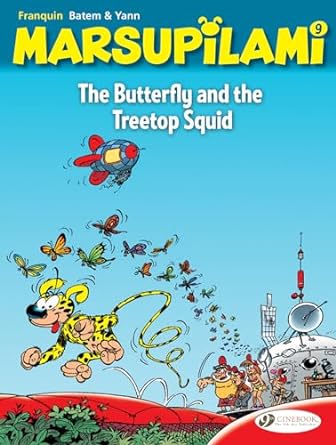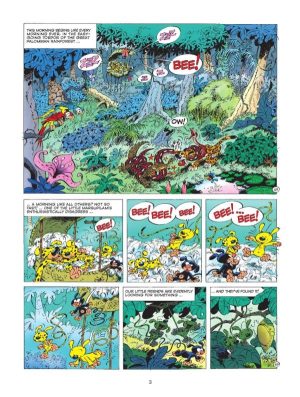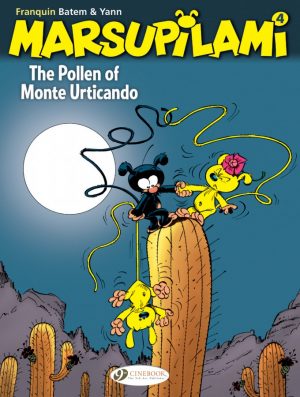Review by Frank Plowright
While Batem’s art has always been utterly joyful in presenting the lives of the eccentric South American jungle dwelling marsupilamis, there’s a feeling writer Yann prefers the comedy set around the supporting cast. That tendency seemed to have been rectified in The Temple of Boavista, but The Butterfly and the Treetop Squid is another occasion where the marsupilamis are forced into the background.
Yann’s priority is a group of eccentrics hunting for rare butterflies. The elderly professor may not fit the comedy stereotype of such characters, being bulky, but he’s almost there, liable to lose his concentration at the sight of a passing butterfly. His expedition is commercially sponsored by a sausage company, with the idiot son of the owner turning up, and that finance enables the treetop squid of the title, a vast inflatable structure only accessible by dirigible and stretching across the jungle canopy. It’s a conceptual triumph.
Four of the five remaining expedition members are pictured on the cover. The absentee is a Japanese scientist, who’s no more caricatured than the remaining cast, yet coloured yellow throughout. It’s astonishing that in 1994 this was considered acceptable, and it’s compounded by a single page where the skin tone is adjusted to something more realistic. That’s down to colour credited to Cerise, a studio team of Cynthia Englebert and Gianluca Carboni.
As seen on the sample art, Batem is on glorious form, packing the pages with detail and and a joyful opening sequences features frolicking young marsupilamis exploring their world. Their father is seen at the start discovering the treetop squid, but very little thereafter.
The crux of the plot is that someone is sabotaging the expedition, and discovering who that might be. The cast are stock comedy stereotypes like the glamorous assistant and the lovestruck young man, played as such and no more. Rival butterfly hunters are introduced on page nine, then not seen again until the final scenes. It’s all clumsy, but might have been saved by a more engaging plot. It never manifests.
Largely due to the art, young readers are likely to be captivated anyway by the silly adults, but Yann’s really on autopilot for his final Marsupilami script.





